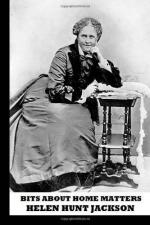Entrees.—LOVE garnished with Smiles.
GENTLENESS, with sweet-wine sauce of Laughter.
GRACIOUS SPEECH, cooked with any fine, savory herbs, such as Drollery, which is always in season, or Pleasant Reminiscence, which no one need be without, as it keeps for years, sealed or unsealed.
Second Course.—HOSPITALITY.
The precise form of this also depends on individual preferences. We are not undertaking here to give exact recipes, only a bill of fare.
In some houses Hospitality is brought on surrounded with Relatives. This is very well. In others, it is dished up with Dignitaries of all sorts; men and women of position and estate for whom the host has special likings or uses. This gives a fine effect to the eye, but cools quickly, and is not in the long-run satisfying.
In a third class, best of all, it is served in simple shapes, but with a great variety of Unfortunate Persons,—such as lonely people from lodging-houses, poor people of all grades, widows and childless in their affliction. This is the kind most preferred; in fact, never abandoned by those who have tried it.
For Dessert.—MIRTH, in glasses.
GRATITUDE and FAITH beaten together and piled up in snowy shapes. These will look light if run over night in the moulds of Solid Trust and Patience.
A dish of the bonbons Good Cheer and Kindliness with every-day mottoes; Knots and Reasons in shape of Puzzles and Answers; the whole ornamented with Apples of Gold in Pictures of Silver, of the kind mentioned in the Book of Proverbs.
This is a short and simple bill of fare. There is not a costly thing in it; not a thing which cannot be procured without difficulty.
If meat is desired, it can be added. That is another excellence about our bill of fare. It has nothing in it which makes it incongruous with the richest or the plainest tables. It is not overcrowded by the addition of roast goose and plum-pudding; it is not harmed by the addition of herring and potatoes. Nay, it can give flavor and richness to broken bits of stale bread served on a doorstep and eaten by beggars.
We might say much more about this bill of fare. We might, perhaps, confess that it has an element of the supernatural; that its origin is lost in obscurity; that, although, as we said, it has never been printed before, it has been known in all ages; that the martyrs feasted upon it; that generations of the poor, called blessed by Christ, have laid out banquets by it; that exiles and prisoners have lived on it; and the despised and forsaken and rejected in all countries have tasted it. It is also true that when any great king ate well and throve on his dinner, it was by the same magic food. The young and the free and the glad, and all rich men in costly houses, even they have not been well fed without it.
And though we have called it a Bill of Fare for a Christmas Dinner, that is only that men’s eyes may be caught by its name, and that they, thinking it a specialty for festival, may learn and understand its secret, and henceforth, laying all their dinners according to its magic order, may “eat unto the Lord.”




